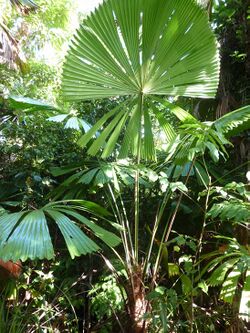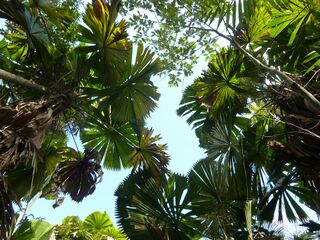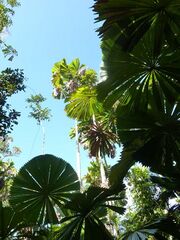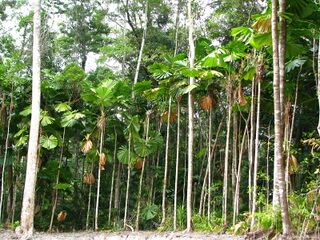Biology:Licuala ramsayi
| Licuala ramsayi | |
|---|---|

| |
| Licuala ramsayi near Mission Beach, Queensland | |
| Scientific classification | |
| Kingdom: | Plantae |
| Clade: | Tracheophytes |
| Clade: | Angiosperms |
| Clade: | Monocots |
| Clade: | Commelinids |
| Order: | Arecales |
| Family: | Arecaceae |
| Tribe: | Trachycarpeae |
| Genus: | Licuala |
| Species: | L. ramsayi
|
| Binomial name | |
| Licuala ramsayi F.Muell.
| |
Licuala ramsayi, commonly known as the Queensland fan palm or Australian fan palm, is a species of tree in the palm family Arecaceae which is endemic to northeastern Queensland, Australia. Two varieties are recognised: Licuala ramsayi var. ramsayi,[1] and Licuala ramsayi var. tuckeri.[2] It is the only species of the genus Licuala present in Australia.
Description
L. ramsayi is a distinctive palm with a single trunk to 16 m (52 ft) tall and 20 cm (7.9 in) diameter.[3] It has large, pleated, circular leaves up to 2 m (6 ft 7 in) in diameter. Petioles have formidable spines to 5 mm (0.20 in) long. The fruits are a red drupe around 10 mm (0.39 in) diameter containing a single seed.[4]
Distribution and habitat
The species grows in swamps, along riverbanks, and in rainforests in Australia. In favourable conditions it may dominate small areas, forming a "fan palm forest".[5] L. ramsayi var. tuckeri is found in Cape York Peninsula southwards to about Cooktown,[2] while L. ramsayi var. ramsayi occurs from Cooktown to the Paluma Range north of Townsville.[1]
Ecology
Trees provided an edible cabbage to Aboriginals, as well as thatch, food wrapping, and cigarette papers (from young leaves)[5] Fruits are eaten by cassowaries.[4]
Gallery
References
- ↑ 1.0 1.1 "Licuala ramsayi var. ramsayi". Centre for Australian National Biodiversity Research (CANBR), Australian Government. 2020. https://apps.lucidcentral.org/rainforest/text/entities/Licuala_ramsayi_var._ramsayi.htm.
- ↑ 2.0 2.1 "Licuala ramsayi var. tuckeri". Centre for Australian National Biodiversity Research (CANBR), Australian Government. 2020. https://apps.lucidcentral.org/rainforest/text/entities/Licuala_ramsayi_var._tuckeri.htm.
- ↑ Dowe, J.L.; Jones, D.L. (2022). "Licuala ramsayi". Australian Biological Resources Study, Department of Climate Change, Energy, the Environment and Water: Canberra. https://profiles.ala.org.au/opus/foa/profile/Licuala%20ramsayi.
- ↑ 4.0 4.1 Cooper, Wendy; Cooper, William T. (June 2004). Fruits of the Australian Tropical Rainforest. Clifton Hill, Victoria, Australia: Nokomis Editions. p. 71. ISBN 9780958174213. https://www.nokomis.com.au/product/nokomis-published-books/fruits-australian-tropical-rainforest/. Retrieved 20 June 2021.
- ↑ 5.0 5.1 Beasley, John (2009). Plants of Cape York - the compact guide. John Beasley. p. 144. ISBN 978-0-9806863-0-2.
External links
Wikidata ☰ Q5975209 entry
 |





